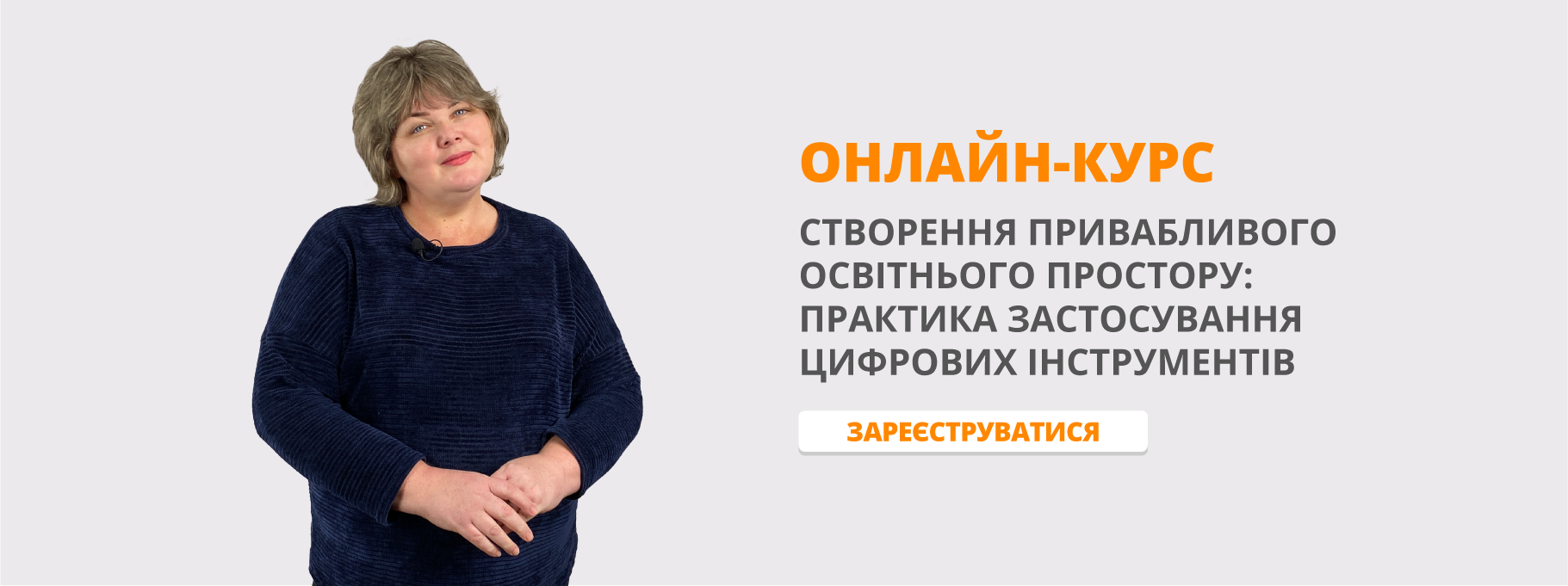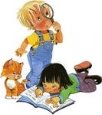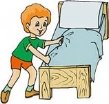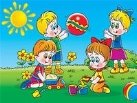Міні - підручник "Time for leisure" для 5 класу
Міні - підручник “TIME FOR LEISURE” створений для учнів 5 – го класу відповідно до нової програми з англійської мови і Державного стандарту базової та повної загальної середньої освіти та підручників з англійської мови для загальноосвітніх навчальних закладів. Це практичний посібник, який складається з 5 уроків і відповідає підтемам нової програми з англійської мови. Міні підручник містить матеріали для фонетичної зарядки, нові лексичні одиниці, ілюстрації, матеріали для індивідуальної , парної та групової роботи, скоромовки, тексти, діалоги, граматичні куточки. В посібнику також є завдання для проектної роботи. Він містить цікаві сторінки, де можна знайти загадки, жарти, ігри. Цей міні підручник допоможе дітям повторити раніше вивчений матеріал. Використовуючи цей підручник, вчитель матиме змогу заощадити свій час в пошуках цікавих і різноманітних вправ, урізноманітнити роботу на уроці і досягти своєї мети – навчити учнів спілкуватися англійською мовою.
Міністерство освіти і науки України
Путивльська районна державна адміністрація
Відділ освіти
Путивльський районний методичний кабінет
Комунальний заклад Сумської обласної ради –
Путивльська загальноосвітня школа – інтернат 1 – 11 ступенів

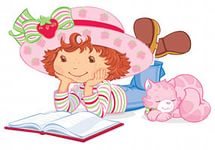
Міні підручник для 5 класу
вчителя англійської мови
І кваліфікаційної категорії
Колтунової Катерини Василівни
м.Путивль, 2014р.
Колтунова К.В. – Міні підручник “TIME FOR LEISURE” для 5 – го класу загальноосвітніх навчальних закладів. – Путивльська загальноосвітня школа – інтернат. П. – 2014. – 41с. Міні підручник “TIME FOR LEISURE” створений для учнів 5 – го класу відповідно до нової програми з англійської мови і Державного стандарту базової та повної загальної середньої освіти та підручників з англійської мови для загальноосвітніх навчальних закладів. Це практичний посібник, який складається з 5 уроків і відповідає підтемам нової програми з англійської мови. Міні підручник містить матеріали для фонетичної зарядки, нові лексичні одиниці, ілюстрації, матеріали для індивідуальної , парної та групової роботи, скоромовки, тексти, діалоги, граматичні куточки. В посібнику також є завдання для проектної роботи. Він містить цікаві сторінки, де можна знайти загадки, жарти, ігри. Цей міні підручник допоможе дітям повторити раніше вивчений матеріал. Використовуючи цей підручник, вчитель матиме змогу заощадити свій час в пошуках цікавих і різноманітних вправ, урізноманітнити роботу на уроці і досягти своєї мети – навчити учнів спілкуватися англійською мовою.
Contents
|
Unit 2. |
TIME FOR LEISURE. |
|
|
Lesson 1 |
All about my friends |
4 - 9 |
|
Lesson 2 |
Hobbies and interests |
10 - 15 |
|
Lesson 3 |
Free time |
16 - 19 |
|
Lesson 4 |
Friends online |
20 - 24 |
|
Lesson 5 (розробка уроку з презентацією) |
Reading 4 fun |
25 - 35 |
|
|
Interesting pages |
36 – 41 |
Lesson 1
ALL ABOUT MY FRIENDS
- Pronunciation drills
a)
|
ck - [k] |
i.y - [i] – ee.ea та e (у відкритому складі) - [i:] |
u - [Λ] |
ar - [a:] |
i - [ai] |
tion –[ʃn] , [ʃən] |
|
Nick black sick nickname
|
pit – Pete tin – teen fit – feet tis - tease |
bus ugly trust clumsy |
car park dark smart |
life polite kind invite |
nation information tradition attention |
b) Read, repeat and learn the tongue-twister.
Sid sees, Sid sees, Sid sees
Six trees, six trees, six trees.
c) New Vocabulary
|
nickname |
[‘nikneim] |
прізвисько |
|
|
clumsy |
[‘klΛmsi] |
незграбний |
|
|
curious |
[‘kjuriəs] |
цікавий |
|
|
helpful |
[‘helpfel] |
корисний |
|
|
imaginative |
[i’mædʒinətiv] |
образний, уявний |
|
|
lazy |
[‘leizi] |
лінивий |
|
|
polite |
[pə’lait] |
ввічливий |
|
|
tidy |
[‘taidi] |
охайний |
|
|
unusual |
[Λn‘ju:ʒuəl] |
незвичайний |
|
|
message |
[‘mesidʒ] |
повідомлення |
|
|
bully |
[‘buli] |
забіяка,хуліган |
|
|
carefully |
[‘keəfeli] |
оборежно |
|
|
invite |
[in’vait] |
запрошувати |
|
|
kind |
[kaind] |
добрий |
|
|
lonely |
[‘ləunli] |
самотній |
|
|
smart |
[sma:t] |
розумний |
|
|
attention |
[ə’tenʃən] |
увага |
|
|
to cheat |
[tʃi:t] |
обманювати |
|
|
to expect |
[ik’spekt] |
очікувати |
|
|
to join |
[dzɔin] |
приєднуватися |
|
|
to tease |
[ti:z] |
дражнити |
|
|
to trust |
[trΛst] |
довіряти |
|
- Answer the questions.
- Have you got a nickname?
- How many friends have you?
- Do you spend much time with your friends?
- Are your friends helpful (clumsy, lazy, polite, tidy, kind, smart, lonely)?
- Do you send e – mail messages to your friends?
- Do you often invite friends to your place?
- Do you trust your friends?
- Read about some British children p.50 – 51 and say if they are true or false. Correct the false sentences.
- Lolly is an usual girl.
- David has got a lot of books about science because he wants to be a teacher.
- Tom is a basketball player and he is in the school basketball team.
- Luka has got a little brother.
- Jasmine is very polite and helpful.
- Work in pairs. Ask each other and answer.
Example: Who is … curious? - Lolly is very curious.
helpful?
lazy?
polite?
tidy?
clever?
- Put the words in the correct order, read the words and translate them.
ANTETITON
GEMASES
ZYLA
TENIVI NELOYL DITY
6. Tell the classmates about your best friend.
Example: My best friend’s name …. He (she) is …. boy (girl). His (her) real name is…. He (she) likes …. …. Has got a lot of … He (she) is very….
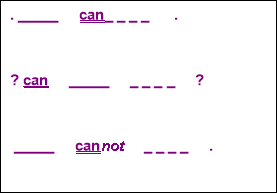 Grammar Corner
Grammar Corner
Remember.
Модальне дієслово
Can(вміти) – можу, можеш, може,…
Example:
1) My sister can cheat.
2) Can your sister cheat? – Yes, she can. (No, she cannot).
3) My sister cannot cheat.
7. Read and translate the sentences.
- You can speak English well.
- His brother can do this exercise.
- We can wear a school - uniform.
- They can answer the phone.
- Children can play computer games.
- You can read your textbook.
- My sister can write well.
- I can do morning exercises.
8. Make up questions and negative sentences (to the sentences from Exercise 7)
9. Complete and write sentences with can or can’t.
|
Swim, read a book in one day, do morning exercises, dance well, paint |
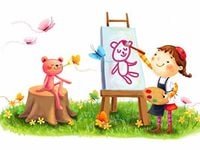
- Ann can paint_______________.
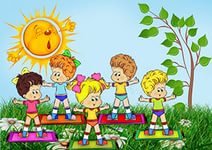
2.Children _______________________________.

3.Jasmine ________________________________.
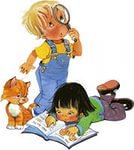
4. Polly _________________________________.
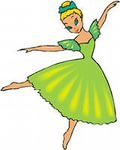
5. Betty _________________________________.
1)Learn the new vocabulary.
Write the story about your friend . (5-6 sentences)
Lesson 2
HOBBIES AND INTERESTS
1. Pronunciation drills
a)
|
ng - [ ŋ ] |
ph - [f] |
oo - [u], [u:] |
ture - [t∫ә] |
all - [כ:l] |
|
running skiing skating swimming |
photo alphabet telephone |
football cartoon book school |
picture culture literature furniture |
ball wall volleyball basketball |
b) Read, repeat and learn the poem.
I like to skip
I like to skip,
I like to jump,
I like to run around,
I like to play,
I like to sing,
I like to laugh and shout.
New Vocabulary
|
camera |
[‘kæmərə] |
фотоапарат |
|
|
|
cartoon |
[ka:’tu:n] |
мультиплікаційний фільм |
|
|
|
coin |
[kɔin] |
монета |
|
|
|
stamp |
[stæmp] |
марка |
|
|
|
to collect |
[kə’lekt] |
колекціонувати |
|
|
|
fair |
[feə] |
ярмарок |
|
|
|
be fond of |
[bi fand əv] |
любити когось, щось |
|
|
|
be interested in |
[bi: ‘intrəstid in] |
цікавитися (чимось) |
|
|
|
take pictures (photos) |
[teik ‘pikt∫ә / ‘fəutəuz] |
фотографувати |
|
|
|
aerobics |
[eә’rәubiks] |
аеробіка |
|
|
|
choir |
[kwaiә] |
хор |
|
|
|
drama group |
[dræmә gru:p] |
драмгурток |
|
|
|
yoga |
[‘jәugә] |
йога |
|
2. Name these pictures.


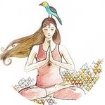







3. Game “Chain”.
- My hobby is dancing. And what is your hobby? - …
4. Read and name the boy’s hobbies.
Children can have different hobbies. Some children collect coins or stamps, some children like to read or play.
My name is Petro. My hobby is reading. Also I attend drama group. I like to read books for children. I also like to go for walks in the park or in the forest. I usually take pictures when I walk. Taking photos is my hobby, too.
5. Let us see if you understand and remember the text.
- What do some children collect?
- What do some children like?
- What is the boy’s name?
- What is his hobby?
- What group does he attend?
- What does he like?
- Where does he like to go for walks?
6. Look at the pictures and tell about Pete’s hobbies:
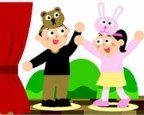
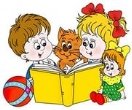

Grammar Corner
Remember. The Present Simple Tense називає регулярну, повторювану дію або постійний стан в теперішньому часі. The Present Simple Tense часто вживається з такими обставинами часу: every day/ week/ month/ year; daily, weekly; on Sundays/ Mondays/ ets.; in the morning, in the afternoon, in the evening; in winter/ ets.; often/ usually/ sometimes/ always/ never/ seldom/ rarely.
Read 1, page 261
|
Present Simple Tense (теперішній неозначений час) |
||||
|
+ |
I You We They He She it |
} get up at 7. } gets up at 7. |
||
|
? |
Does |
I we you they
he she it |
} get up at 7? |
Yes, I / we/ you/ they do. No, I / we/ you/ they don’t. Yes, he/ she/ it does. No, he/ she/ it doesn’t. |
|
- |
I You We They He She It |
} do not } does not |
} get up at 7. |
|
- Make sentences about Max.
- live/ Kharkiv/ in - Max lives in Kharkiv.
- get up/ in the morning/ 7 o’clock/ at
- go/at/ school/ to/ 8 o’clock
- do/ homework/ every day
- has got/ 90/ coins/ and/ hundreds of/ stamps
- read/ in/ books/ bedroom/ his
- watch/ at/ TV/ weekends
- go/ bed/ to/ 10 o’clock/ at
- Complete the dialogue.
Mark: Do you like to do something every day?
Kim: Yes, I _______.
Mark: What _______ you do?
Kim: I swim _____.
Mark: What time ______ you start?
Kim: I ______ at 7. I ______ up at 6 o’ clock every morning.
Mark: _____ you swim in a swimming pool?
Kim: No, I ______. I ______ in the river
Mark: Really? _____ your parents go with you?
Kim: No, they _______. My dog ______ with me!
Mark: ______ it swim with you?
Kim: No, it ________. It sleeps. Swimming is only my hobby.
- True or false? If a sentence is false, use 'don't or ‘doesn’t’ in it.
- Kim does something every day.
- Mark swims every day. – Mark doesn’t swim every day Kim swim every day.
- Kim gets up at 7 o’clock every day.
- Kim swims in the swimming pool.
- Kim goes to the river with her parents.
- Dog swims with Kim.
9. Complete the sentences. Use to play the, to play, to go. Write them.
1. 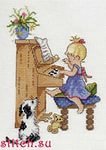 Vicki plays the piano.
Vicki plays the piano.
2. 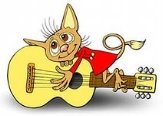 Tom ____________.
Tom ____________.
3. 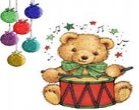 Bear__________________.
Bear__________________.
4. 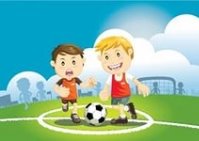 Pete and Max _________________.
Pete and Max _________________.
5. 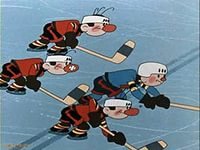 Children _______________________.
Children _______________________.
6. 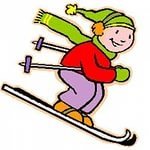 Oleh __________________________.
Oleh __________________________.
7. 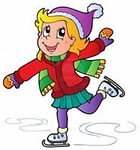 Mary__________________________.
Mary__________________________.
1)Learn the new vocabulary.
Project Work 1
Draw and write about your hobby. (Намалюй і напиши про своє хобі.)
Lesson 3
FREE TIME
1. Warming up
HOW ACTIVE ARE YOU?
1. At the weekend, when it’s sunny, which of these things do you like doing?
a) sitting in the garden reading a book;
b) going to the swimming pool;
c) playing tennis or football.
2. On a cold, wet Sunday afternoon which of these activities do you like doing?
a) going to the cinema;
b) staying at home and doing nothing;
c) playing table tennis with friends.
3. After a long day at school, which of these activities do you like doing?
a) watching TV;
b) visiting your friends;
c) playing games with your family.
Scores
|
|
а |
b |
с |
|
1 |
0 |
1 |
2 |
|
2 |
1 |
0 |
2 |
|
3 |
0 |
2 |
1 |
Results
7—9 = you are very active!
4—6 = you like doing things!
Under 4 = you love relaxing!
Answer the question: Who are you? What do you like to do?
«І like doing things», «I’m very active», «I’m relaxing».
New Vocabulary
|
badge |
[bædʒ] |
значок |
|
|
fancy dress |
[‘fænsi dres] |
костюм |
|
|
glue |
[glu:] |
клей |
|
|
guest |
[gest] |
гість |
|
|
invitation |
[invi’tei∫n] |
запрошення |
|
|
pastime |
[‘pa:staim] |
розвага |
|
|
theme |
[θi:m] |
тема |
|
2. Spelling test.
Using the letters make up new words. Translate them.
1. METHE –
2. EMTISAP –
3. DABEG –
4. NIVIATONTI –
5. LEUG –
6. FNAYC SSERD –
7. STEGU –
3. Make up sentences with the new words.
Example: I like fancy dress parties.
4. Match the parts of the questions.
[f] 1) What is a) take you to do your homework!
[ ] 2) What do you b) play badminton?
[ ] 3) How long does it usually c) a day do you watch TV?
[ ] 4) Are you a member d) think of collecting coins?
[ ] 5) Where can you e) of sports in your class?
[ ] 6) Who is fond f) your hobby?
[ ] 7) How many hours g) of any club, group or section?
5. Answer the questions of Task 3.
1) My hobby is reading._________________
2)___________________________________
3)___________________________________
4)___________________________________
5)___________________________________
6)___________________________________
7) ____________________________________
6. Read the text and draw picture for this text.
It’s a sunny morning and Kate and Tom are getting ready for their cousin’s birthday party. It’s a fancy dress party. Kate is wearing a beautiful dress and a tall hat. She is wearing a princess’s costume. Tom is wearing a false nose, big trousers and very big shoes. He is wearing a clown’s costume. Kate is smiling. She’s happy because she loves parties. Her brother Eric isn’t smiling because he doesn’t like parties. He hates dancing. He wants to stay at home and watch the football match on television with his father.
Grammar Corner
REMEMBER
|
Time markers: Present Simple |
||
|
always |
|
She always gets up at 7 o’clock. |
|
usually |
|
She usually makes her bed. |
|
sometimes |
|
She sometimes does morning exercises. |
|
rarely |
|
She rarely watches TV in the morning. |
|
never |
|
She never plays games before school. |
- Make up sentences about your pastime (using the words).
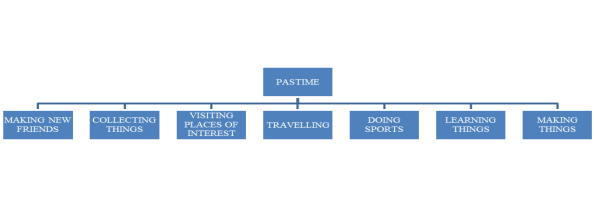
- Translate into English.
- Я інколи люблю виготовляти запрошення для моїх гостей.
- Зазвичай Тарас пише запрошення на кожну вечірку.
- Моїм батькам завжди дуже подобаються тематичні вечірки.
- Ен завжди приходить на вечірку в костюмі.
- Іноді мої друзі і я любимо вечірки з ночівлею.
- Я рідко танцюю на вечірках.
1)Learn the new vocabulary.
Project Work 2
Write and design an invitation card for your party.
Lesson 4
FRIENDS ONLINE
1. Pronunciation drills
a) Read, repeat the poem and think of a title for it.
Being a good friend is really an art.
A wonderful talent, that comes from the heart.
It’s knowing a kind thing, to do or to say,
Listening and talking, a problem away.
Its being together, in good times and bad,
And just with a smile, making each other glad.
It’s caring for someone, and showing it, too,
Thank goodness for good friends,
Friends just like you!
New Vocabulary
|
contact |
[‘kantækt] |
контакт |
|
|
experience |
[ik’spiəriəns] |
досвід |
|
|
freak |
[fri:k] |
дивацтво, дивак |
|
|
to search |
[sέ: t∫] |
пошук, шукати |
|
|
to share |
[∫eə] |
ділитися |
|
|
useful |
[‘ju:sfl] |
корисний |
|
|
to be keen on |
[bi: ki:n כn] |
захоплюватись чимось |
|
|
to waste time |
[weist taim] |
даремно витрачати час |
|
2. Match. Make the word – combinations. Translate them.
 1. to share
1. to share
2. to use
3. to make
4. to send
5. to search
6. to waste
3. Ask and answer in pairs.
a) time
b) e – mails
c) experience
d) information
e) an e – mail friends
f) the Internet
1. Have you got a computer at home?
2. Can you use a computer?
3. Do you go to a computer centre?
4. Do you play computer games?
5. Can you work on a computer?
6. How much time do you spend on a computer every day?
4. Read and translate the letter.
65, Allendale Road
London — GI5 8SG
July 27, 2014
Hello Jane,
What are you doing? I’m just writing to let you know that everything is all right now. This is a nice quiet place. The people are friendly, and the weather is warm. We’ve been staying here for ten days now, and we are already used to it.
I walk a lot, but Phil just spends his time playing computer games and writing e – mail letters. Sometimes we are going for a walk together.
Last week I went to the nearest park. This is a very beautiful place. I saw a lot of squirrels, they were so noisy and begged for food all the time. I gave them all the peanuts that I had. There is also a small pond at the park with ducks and beautiful water lilies.
Next week I’m going to start reading the new book, and it’s going to be very hard work. That is all for now.
Give my regards to Peter and the family. I look forward to hearing from you soon.
Your loving sister,
Ann
- Say if the sentences true or false.
- Ann was writing to let Jane know that everything was all right.
- The people were friendly, but the weather was cold.
- Ann and Phil walked a lot.
- Phil played computer games and wrote e – mail letters
- Ann saw a lot of foxes.
- There was a big pond at the park with swans.
- Work in group. Think and say who in your group is keen on:
- playing computer games
- speaking English
- reading books
- e – mailing
- making e – mail friends
- spending too much time on a computer
Grammar Corner
Remember.
|
THE GERUND (Герундій) Talk about likes and dislikes with the gerund form. |
||
|
I/WE/YOU/THEY |
like/ don’t like |
playing |
|
love |
dancing |
|
|
hate |
doing homework |
|
|
HE/SHE/IT |
likes/ doesn’t like |
swimming |
|
loves |
reading |
|
|
hates |
singing |
|
- Read. Then complete the table.
|
Tom loves fishing and riding a bike in the countryside, but he doesn’t like the river. He doesn’t like swimming and he hates diving. |
|
Nick likes sports. He loves playing football but he hates watching it on TV. He doesn’t like parties and he hates writing e – mail letters. |
|
Ann loves dancing and shopping. She doesn’t like sports and she hates doing her homework. |
|
|
loves |
likes |
doesn’t like |
hates |
|
TOM |
fishing |
|
|
|
|
NICK |
|
|
|
|
|
ANN |
|
|
|
|
8. Write about the people.
|
|
Lucy |
Lucas and Vicki |
Ben |
|
swimming |
|
X |
+ |
|
playing football |
X |
|
XX |
|
making new friends |
+ |
|
|
|
playing computer games |
XX |
+ |
+ |
|
wasting time |
X |
XX |
X |
![]()
- love + - like X – not like XX - hate
1. Lucy loves swimming. She likes making new friends. But she _________________________________________________________.
2. Lucas and Vicky ____________________________________. They _________________________________________________________.
But they___________________________________________________.
3.____________________________________________________________________________________________________________________________________________________________________________________________________________________________.
9. Complete the letter. Use the correct form of the words.
Dear Kate,
It (be) is___ wonderful here! We (be) __________ at the beach and I (love/ swim) _______________, (jump)______________ and (play) _______________ in the sea.
I (like/ dive) ___________, too. There (be) ________ a diving club here. Tim ( not like/ dive)______________ and he (hate/ swim) ____________________ but he (love/ sit) on the beach and (like/fish)!
Love, Ann
1)Learn the new vocabulary.
Write the letter to your pen - friend (using the gerund).
Lesson 5
READING 4 FUN
Тема: Happy birthday.
Підтема: “Winnie-the-Pooh and his friends”, “Eeyore’s birthday”.
Мета: вдосконалювати комунікативні здібності, розширювати знання учнів з теми; розвивати навички діалогічного та монологічного висловлювання, фонематичний слух, здатність до імітації, якість вимовних навичок, слухову пам'ять, уяву, здатність до здогадки; вміння учнів користуватися лексикою, послідовно та логічно висловлювати свої думки іноземною мовою, сприяти розвитку інтелекту учнів; виховувати інтерес до вивчення іноземної мови, доброзичливе ставлення до друзів, однокласників.
Обладнання: презентація до уроку, ноутбук, назви слів, роздатковий матеріал, картки, горщик, кулька.
PROCEDURE
- The beginning of the lesson.
- Greeting, setting aims.
- Hello ! How are you? Today I want to practice English with your.
Would you like to play with me?
- Warming up.
- Look at the screen and guess what’s our lesson about?
Let’s start! (слайд 2) (discussing pictures)
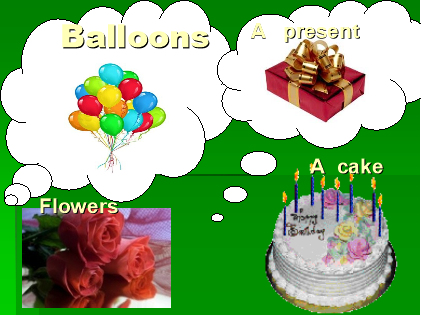
What is this? What are your ideas about today’s lesson?
The cake with candles is the main thing of Birthday Party! Really?
You’re clever. The topic of our lesson is “ Birthday” (слайд 3).
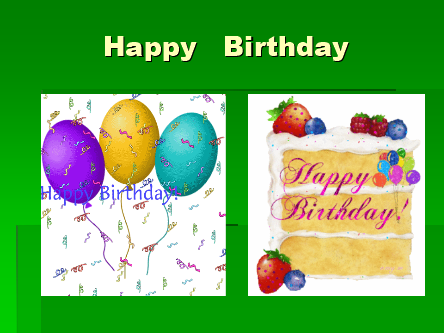
I think you like your Birthday Party and today we’ll prepare for it.
Do you know any poem about birthday? Let’s read one of them.
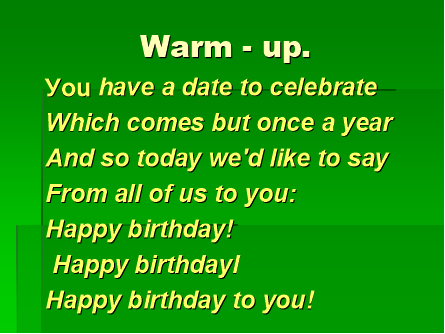
You have a date to celebrate
Which comes but once a year
And so today we'd like to say
From all of us to you:
Happy birthday! Happy birthday!
Happy birthday to you!
ІІ. The main part of the lesson.
1. Presenting the theme of the lesson.
1)Did you read tales by A.Milne?
2)Do you know the story about Winnie-the-Pooh and his friends?
3)Did you like it?
Teacher: Yes, you are right. The topic of our lesson is “Winnie-the-Pooh and his friends”.
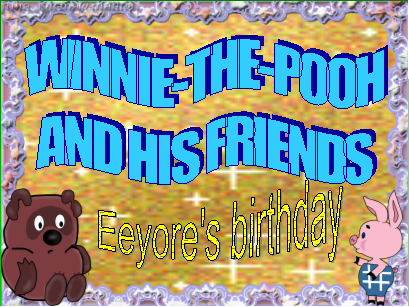
Today at the lesson we’ll
- practice new vocabulary in speech;
- revise verb tenses;
- do exercises on the text.
2.Watching a cartoon “Eeyore’s birthday”.
Do you like the cartoon?
1)Guess the words. Group work of three.
Iniewn –Winnie, eoeeyr-Eeyore, nkodye-donkey, thaydrib-birthday, aboonll-balloоn, telgip – Piglet.
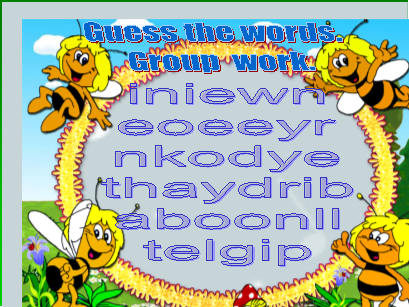
2) Who said these words:
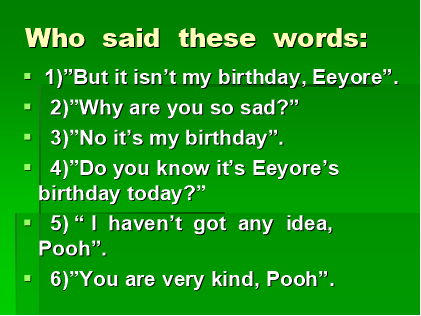
1)”But it isn’t my birthday, Eeyore”.
2)”Why are you so sad?”
3)”No it’s my birthday”.
4)”Do you know it’s Eeyore’s birthday today?”
5) “ I haven’t got any idea, Pooh”.
5)”You are very kind, Pooh”.
3. Role – play “Eeyore’s birthday”.
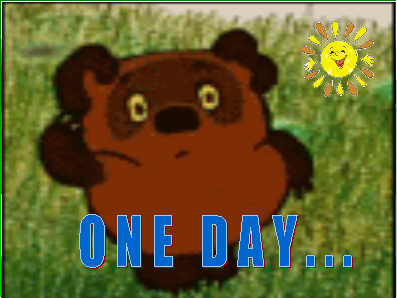
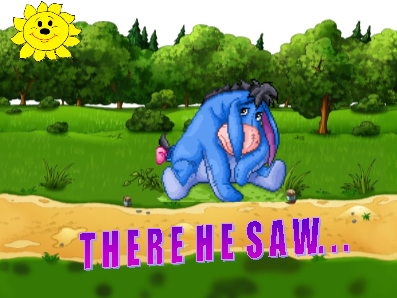
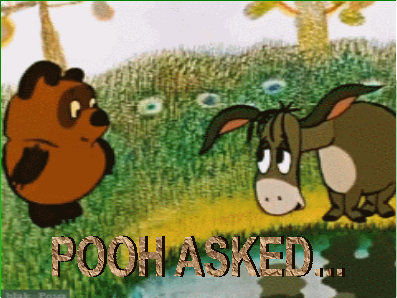
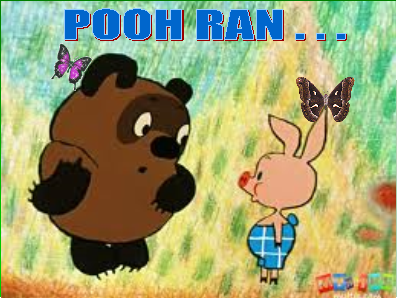
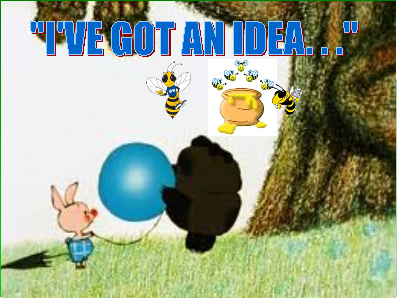
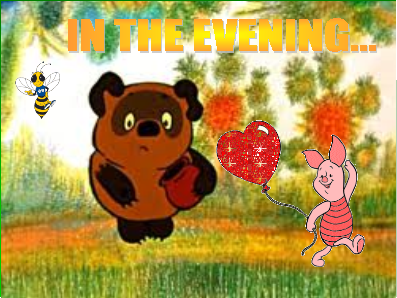
4. Rest time. Song “Happy birthday”.
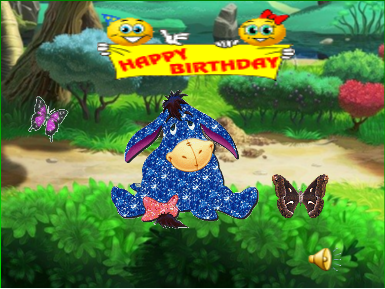
T: One more congratulation is the song « Happy Birthday »
Happy birthday to you!
Happy birthday to you!
Happy birthday, dear …!
Happy birthday to you!
May your birthday be bright!
May your birthday be bright!
May your birthday be bright!
From morning till night.
5. Work time.
1) Answer the questions (питання діставати з горщика з надписом “honey”)
1.When did Winnie-the –Pooh get up one day?
2.Who did he see in the forest?
3.Why was Eeyore so sad?
4.Did the Piglet know about Eeyore’s birthday?
5.What presents will Pooh give Eeyore?
6. What presents will Piglet give Eeyore?
2) Choose the right word:
1. Winnie got up early/late in the morning.
2.He went for a walk in the forest/ field.
3.There he saw the donkey/ the piglet.
4.Pooh ran home/ to the forest to get a present.
5.I shall give him a jar of honey/ milk.
6. In the evening/ morning happy friends went to Eeyore’s birthday party.
3) True or false:
- One day Winnie-the-Pooh met a donkey.
- The donkey looked very happy.
- It was Pooh's birthday.
- The donkey wanted to say 'thank you'.
- Pooh went home to get Eeyore a present.
- On his way home he met a Rabbit.
4) Work in groups: - arrange the sentences in the right order:
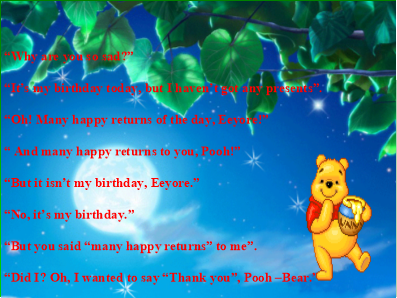
“Why are you so sad?”
“It’s my birthday today, but I haven’t got any presents”.
“Oh! Many happy returns of the day, Eeyore!”
“ And many happy returns to you, Pooh!”
“But it isn’t my birthday, Eeyore.”
“No, it’s my birthday.”
“But you said “many happy returns” to me”.
“Did I? Oh I wanted to say “Thank you”, Pooh –Bear.”
5. What poems about birthday do you know? Let’s recite them.
Count your nights
By starts,
Not shadows,
Count your days
By smiles,
Not tears.
And on any birthday morning
Count your age by friends, -
Not years!
Wishing you a birthday
That is just the happy start
Of a year that brings you everything
That’s dearest to your heart.
III. Summing up.
Have you learned anything new? What did you like about the lesson?
Say, what words associate with “Birthday”.
1)Find 10 words about “Birthday”
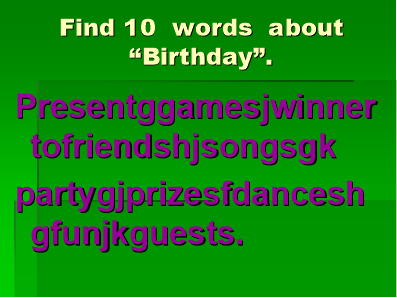
Presentfgcardhjcakefriendshjsongsgkpartygjcandydanceshgfunjkguests
( Present, card, cake, friend, songs, party, candy, dances, fun, guests).
Write and translate the words.
2) Home work.
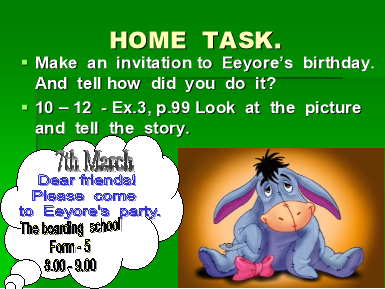
- Make an invitation to Eeyore’s birthday. And tell how did you do it?
- 10 – 12 – Ex. 3, p. 99 Look at the pictures and tell the story.
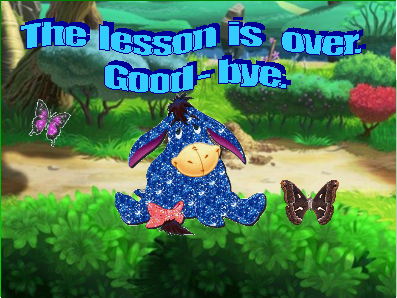
Interesting pages
- Guess the riddles.
- W hat hobby is it?
1. Such people like to visit different cities, towns and historical places. Some people even visit other countries. They can travel by car, by plane, by train, by bus or on foot. This hobby helps them to learn history, geography and traditions of different people and countries.
Travelling
2. People like to spend their free time near the rivers or lakes . They often go there with their friends or relatives . They can have a picnic there. They go usually there in summer but some people like to go there in winter too . Also they can boil fish after going there.
Fishing
3. This hobby is interesting and useful. People try to find or buy different things such as stamps, badges, coins, pictures and dolls. Their collection can be thematic. This hobby helps people to make new friends and to learn some new things about countries and lands, animals and birds, famous people and historical events.
Collecting
4. This hobby is popular with the people of all ages. People like to go to the stadium or to the sports ground. They are strong and healthy. Their hobby helps to develop their mind and body and teaches them to plan their time.
Sports
5. People like to go to the library. Some of them have a good collection of books at home. And they are really proud of it. They can have different books: fiction, historical novels, books about animals and birds, books about different countries. Their hobby helps them to relax, to learn the world and understand people better.
Reading
- Jokes.
-
Girl: You would be a good dancer except for two things.
Boy: What are the two things?
Girl: Your feet. -
Pupil: Sir, would you punish someone for something they didn’t do?
Teacher: Of course not.
Pupil: Oh good, because I didn’t do my homework. -
A teenage girl had been talking on the phone for about half an hour, and then she hung up.
“Wow!,” said her father, “That was short. You usually talk for two hours. What happened?”
“Wrong number,” replied the girl.
-
Father: What did you do today to help your mother?
Son: I washed the dishes
Daughter: And I helped pick up the pieces. -
Teacher: Did your father help your with your homework?
Student: No, he did it all by himself. -
A family of mice were surprised by a big cat.
Father Mouse jumped and said, “Bow-wow!” The cat ran away.
“What was that, Father?” asked Baby Mouse.
“Well, son, that’s why it’s important to learn a second language.”
- Games.
- Гра «Guess the word» (10 хвилин)
Для цієї гри необхідна кольорова крейда.
Учитель у довільному порядку пише на дошці вивчені слова по темі “Хобі”. Учні читають їх вголос. Потім клас ділиться на дві команди. Кожна з команд отримує крейду різного кольору. Учитель називає слово, а перший учень з кожної команди біжить до дошки та обводить слово. Потім – другий, третій… Виграє команда, яка обведе більшу кількість слів.
2. Гра «Boasting game» (4 хвилини)
Учні змагаються у кількості рухів, які вони можуть назвати й продемонструвати. Кожний по черзі показує рух і називає його англійською, а всі повторюють. Виграє той, хто назве найбільшу кількість дієслів.
I can jump (стрибає).
I can swim (імітує плавання).
I can run (біжить).
I can dance (танцює).
3. Гра «Snowball» (5 хвилин)
Перший гравець вимовляє коротке речення по темі “Хобі”, яке складається з 3-4 слів . Другий повинен повторити його і додати до нього своє. Наступні гравці за чергою роблять те саме. Той, хто не може в пам’яті відновити усі речення, вибуває з гри.
4. Гра «Guess who is that» (8 хвилин)
Один учень призначається ведучим. Тримаючи одну руку за спиною долонею вгору, він стає спиною до інших гравців, які стоять півколом біля нього. Гравці вимовляють:
We are very funny guys,
Turn away and close your eyes!
We will pat you on the back.
Say “one, two, three” and guys who’s that.
Один з гравців непомітно підходить до ведучого, торкається його руки та відходить на своє місце. Як тільки ведучий відчуває чиєсь торкання, він починає вголос рахувати “one, two, three”, потім повертається обличчям до гравців та намагається відгадати, хто до нього підходив. Усі гравці переступають з ноги на ногу. Якщо ведучий відгадує, він міняється місцями з тим гравцем, котрий до нього підходив. Якщо ні, то гра продовжується з тим же самим ведучим.
5.Гра «Miming Game».
Один з учнів за допомогою міміки та жестів показує, чим він захоплюється. Клас намагається відгадати, ставлячи запитання в Present Continuous.
- Learn the rhyme.
1. Work while you work.
Play while you play.
This is the way
To be happy and gay.
2. It’s party time, it’s party time.
Time for games and time for toys,
Time for happy girls and boys,
Time for cakes and gifts for you,
Time to laugh and say «Thank you».
3. We are good friends
My hobbies and I.
We have such fun
My hobbies and I
We are good friends.
Can you say why?
4. Come to the party
Today, if you please.
Roses and lilies
Will dance in the breeze.
Bright yellow candles
Will bow to the blue.
All will be dancing,
And I’ll dance with you.
5. WHAT ARE YOU GOING TO DO AT TWO?
What are you going to do at two?
What are you going to do?
Where are you going to be at three?
Where are you going to be?
Who are you going to see?
What are you going to say?
How are you going to go?
Where are you going to stay?
What are you going to do?
Who are you going to see?
When are you going to leave?
Where are you going to be?
1


про публікацію авторської розробки
Додати розробку
